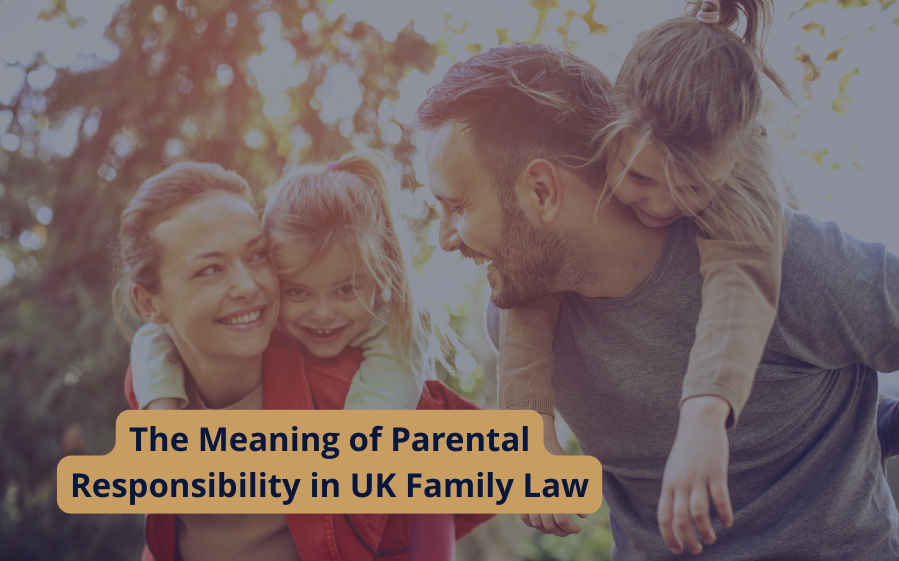
When it comes to raising a child, knowing your rights and responsibilities is essential, especially during separation, disputes, or court proceedings. A common question we hear from parents is: What is parental responsibility, and what does it actually mean in practice?
This article explains the meaning of parental responsibility in UK family law, who has it by default, how it can be obtained, and what happens when disagreements arise between parents.
What Is the Meaning of Parental Responsibility?
Under UK family law, parental responsibility refers to all the legal rights, duties, powers, and responsibilities a parent has in relation to their child and the child’s property. In short, it means being legally recognised as responsible for making important decisions in a child’s life.
This includes decisions such as:
- Where the child should live
- What name the child uses
- What school they attend
- Consenting to medical treatment
- Religious upbringing
- Applying for a passport
- Taking the child abroad
The law assumes that individuals with parental responsibility will act in the child’s best interests and work together to make major decisions, even if they are separated or no longer in a relationship.
Who Automatically Has Parental Responsibility?
The meaning of parental responsibility in law includes understanding who holds it automatically:
- Mothers always have parental responsibility from birth.
- Fathers automatically have parental responsibility if they were:
- Married to the mother at the time of birth, or
- Named on the child’s birth certificate (for births registered in or after December 2003 in England and Wales)
For same-sex parents:
- A second female parent will usually have parental responsibility if they were married or in a civil partnership with the birth mother at the time of conception or through legal adoption.
How Can Unmarried Fathers Get Parental Responsibility?
If a father is not named on the birth certificate and not married to the mother, he can still gain parental responsibility through one of the following methods:
- Re-registering the child’s birth with the mother’s agreement, to include his name on the birth certificate
- Signing a Parental Responsibility Agreement with the mother
- Applying for a Parental Responsibility Order through the Family Court
- Being granted a Child Arrangement Order stating that the child should live with him
- Becoming the child’s legal guardian through other court processes (e.g. adoption or special guardianship)
A family law solicitor can assist in any of these situations, especially if the other parent is unwilling to cooperate or if court intervention is required.
What If Parents Disagree?
While each parent with parental responsibility has equal rights in theory, in reality, disagreements can and do happen, particularly following separation or divorce.
Common areas of dispute include:
- Which school the child should attend
- Whether a child can be taken abroad
- Consent for medical procedures
- Religious or cultural upbringing
If parents cannot agree, the court may step in. Either parent can apply for:
- A Specific Issue Order: to resolve a particular disagreement (e.g. choosing a school)
- A Prohibited Steps Order: to prevent the other parent from taking a specific action (e.g. moving abroad without permission)
In these situations, advice from a children’s panel solicitor is often vital. These are solicitors who specialise in representing parents and children in complex public and private law cases involving children.
What If Only One Parent Has Parental Responsibility?
If only one parent holds parental responsibility, for example, if the father has never acquired it, then that parent can legally make key decisions alone.
However, even without parental responsibility, a parent can still apply to the court for:
- Contact arrangements (via a Child Arrangement Order)
- A Parental Responsibility Order, if they want to be involved in major decisions
It’s important to understand that parental responsibility does not determine day-to-day contact or who the child lives with. Those matters are resolved separately, usually through agreement or a court application.
Why Understanding Parental Responsibility Matters
Understanding the meaning of parental responsibility empowers parents and carers to make informed choices and protect their child’s best interests. It ensures that important decisions, from education to healthcare, are made legally and cooperatively.
Whether you’re a parent seeking clarity on your rights, or a relative stepping in to support a child, professional legal guidance can make the process clearer and less stressful.
Get Expert Advice from a Family Law Solicitor
At Berkson Family Law, our experienced team includes family law solicitors and children’s panel specialists who support parents, guardians, and relatives through complex decisions about their children’s lives.
If you’re unsure whether you have parental responsibility, want to apply for it, or are dealing with disagreements over your child’s care, we’re here to help with clear advice and compassionate legal support.
You can book a free, confidential consultation with one of our expert solicitors or email us at info@berksonfamilylaw.co.uk for further guidance.

